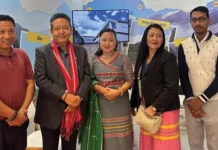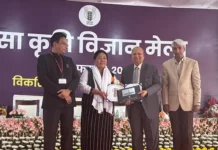[Asuni Khamblai]
What would have been the answer of the youngsters if they had not been introduced to the literal definition of mother tongue?
According to prof. B.P Mahapatra, an Indian linguist, “Mother tongue is not merely a means of communication but a symbol of cultural identity and emotional belonging.” It is, indeed, a bridge that connects indigenous people to their rich history of vibrant culture and tradition. Though colonialism ended 78 years ago, the reason behind erosion of our mother tongue is not carried forward with pride, which makes us feel that unconsciously our mind and soul are colonized till date.
In addition, the indigenous community has also set so called standards–a child with weak command of their mother tongue but fluent in English is commended, whereas the kid who is well versed in their own mother tongue is mocked for not knowing foreign language.
Today’s generation of kids learn to speak Hindi or English as their first language. Their command of these two languages is more fluent than their own dialects. Moreover, every household has a kid who does not know how to speak their own mother tongue. This phenomenon is like a tradition today.
Currently, modernization has also had huge impact on the downfall of mother tongues as the worldview of modernization has changed drastically among intellectual minds. Likewise, in today’s scenario treating Hindi or English language as foreign is seen as primitive.
And, many parents, especially in interior villages, emphasize learning Hindi or English before their mother tongue to protect their children from inferiority complex. It is because this language is attached to shame.
A six-year-old, who has just entered the phase of learning a dialect, is expected to at least speak or understand Hindi before he/she is enrolled in school. In addition, as many of the tribes do not have their own script, the elders in a society are believe to be pioneers of culture and tradition, but the new elders seems to lack the traits and pride of the said belief. It is clearly a threat to indigenous identity and signals erosion of our cultural memory and folklore.
The age-old tradition of storytelling is almost dying out. Every story helps people reflect way of living, the history, and rich heritage of their community. Unfortunately, the language gap between elders and youngsters stands as a barrier for spreading this joy.
An elderly grandma at home is ready to narrate a story about mystical legends to her grandchildren but the child’s inability to grasp the meaningful narration hinders the transfer of knowledge. Not just folklores, random stories could also lead us in navigating the resolutions that the society has made in the past, the traditions and practices that have faded away in the process of evolution.
The younger generations is missing out so many significant aspects of culture due to neglect of mother tongue, which in turn is affecting the transfer of oral traditional practices that holds cultural significance.
Now the question is who is to blame?
The parents who have failed to foster ownership of their mother tongue with pride, the society that made them feel inferior for not knowing foreign language or the education system that has never really encouraged the students to share their thoughts in mother tongue until recently?
The National Education Policy 2020 has emphasized on the uses of local languages as the medium of instruction up to atleast grade 5 and grade 8. This new policy will be a help in fostering the pride in the mother tongue among the children.
However, we must also keep in mind that everyone who can write in English cannot speak English fluently.
Likewise, among those, who do not understand their mother tongue at all, there are some who understands but can only speak in words. Normalizing such circumstances adds to erosion of original pronunciations of words.
Thereafter, an education system can play a vital role by emphasizing not just written but oral practices by encouraging them to read, write and express themselves in their own dialect.
Since a large group of students are enrolled in private institutions, the government should also encourage them to implement the curriculum in their institutions through incentives. Subsequently, these government initiatives alone would not be able to meet the vision if the indigenous community does not join hands to bring change in society. The language that a parent wants to communicate with their child is completely a personal choice, but this conscious action is degrading the worth of the mother tongue collectively.
It is time for the society to stop normalizing the negligence of mother tongue. It would be very helpful if parents start engaging their children in community-driven activities and make sure to use their own dialect within their home. It is not just a matter a means of communication; it means burying the history, rich culture and weakening the solidarity among the community consciously. (The contributor of the article is pursuing master’s degree in tribal studies at Arunachal Pradesh University, Pasighat).




